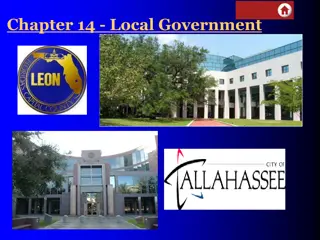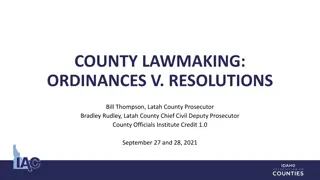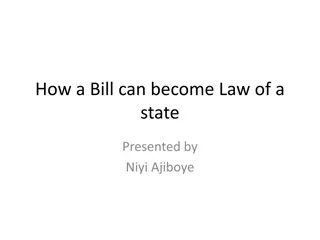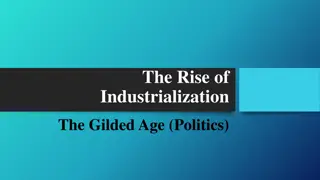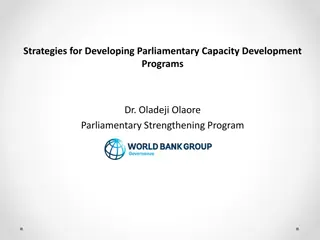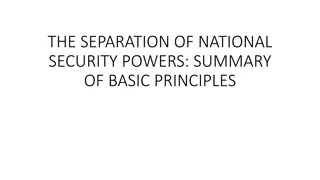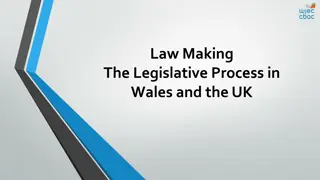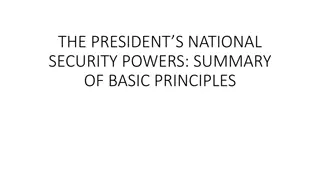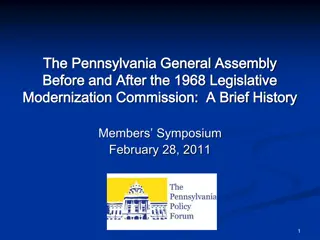Understanding Local Government: Powers, Responsibilities, and Organization
Local governments are established by state governments and provided powers through charters. They deliver essential services like road maintenance, water supply, and waste collection. Municipalities have self-government to serve their citizens. Ordinances, statutes, and acts regulate local laws and
3 views • 17 slides
Understanding County Lawmaking: Ordinances vs. Resolutions
Explore the differences between ordinances and resolutions, their enforcement, and implications within counties. Learn when each is required or permitted, and receive tips for drafting clear and concise legal documents.
1 views • 30 slides
Understanding the Legislative Process: How a Bill Becomes Law in a State
The legislative process of how a bill becomes law in a state is elucidated here, covering the roles of the legislature, the law-making process, the definition and importance of bills, and the objectives they aim to achieve. Through this detailed explanation, legislative practitioners gain insight in
0 views • 38 slides
Challenges of Democracy and Corruption in the Gilded Age
The Gilded Age (1877-1900) was a time of political inaction and widespread corruption, raising doubts about the endurance of democracy in the face of powerful corporations and wealthy individuals. The era saw a balance of power with partisan divides making lawmaking difficult. Presidents like Ruther
0 views • 11 slides
Democratic Lawmaking in the EU: Promises and Pitfalls of the Ordinary Legislative Procedure
This presentation explores the evolution and impact of the Ordinary Legislative Procedure (OLP) in the European Union, discussing its democratic innovations and achievements post-Lisbon. Topics covered include the implementation of OLP, its democratic implications, and the use of trilogues as negoti
0 views • 11 slides
Enhancing Parliamentary Capacity Development Programs: Strategies and Approaches
Parliamentary capacity development programs aim to enhance the functions of parliaments for effective oversight, representation, and lawmaking to contribute to a country's development agenda. Understanding legislative institutions' complexity and involving various stakeholders are crucial. Approache
0 views • 12 slides
Understanding the Separation of National Security Powers
The separation of national security powers involves the formalist view where Congress makes laws, the Executive executes them, and the courts interpret them. The branches' powers are often blurred, with Congress able to delegate lawmaking power to the Executive. The Executive can also acquire custom
0 views • 8 slides
Understanding the Legislative Process in the UK and Wales
Explore the legislative process in the UK and Wales, from the composition of Parliament to the role of the House of Commons and House of Lords. Learn about the power of Parliament, the influence of EU membership and the HRA 1998, and the creation of Acts of Parliament. This comprehensive overview to
0 views • 15 slides
Understanding the Hierarchy of Lawmaking in Government
Laws are made through legislatures at different levels of government, including federal, state, and local bodies. Each level has varying degrees of power and scope in creating and enforcing laws. In case of conflicting laws between state and federal governments, the Supremacy Clause of the Constitut
0 views • 21 slides
Presidential National Security Powers: Summary of Basic Principles
In Zivotofsky II, the Supreme Court recognized the President's exclusive implied powers despite acknowledging the role of Congress in lawmaking. While the President engages in foreign affairs activities, no general plenary and exclusive foreign affairs power is explicitly vested in the Constitution.
0 views • 9 slides
History of the Pennsylvania General Assembly Before and After the 1968 Legislative Modernization Commission
The Pennsylvania General Assembly, America's largest full-time legislature, faced chronic deficits and partisan combat in 1968, leading to the creation of a bipartisan Commission on Legislative Modernization. The commission, comprising experienced leaders, aimed to improve legislative performance an
0 views • 22 slides
